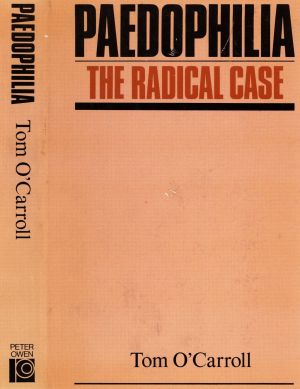One of our staff members is contributing considerably to a News Archiving service at Mu. Any well educated (Masters, PhD or above) users who wish to make comments on news sites, please contact Jim Burton directly rather than using this list, and we can work on maximising view count.
Paedophilia: The Radical Case: Difference between revisions
Created page with "'''Paedophilia: The Radical Case''' was first published in England by Peter Owen Press (London, 1980), and then America by LGBTQ+ Press Alyson Publications (Boston, 1982), with a foreword by Gay historian Prof. Hubert Kennedy. It is the first book written by Thomas O'Carroll (b. 1945), the most well-known Chairperson of the Paedophile Information Exchange (PIE) in the UK, an organization originally founded in Scotland by Gay activists Michael Hanson and Ian C..." |
No edit summary |
||
| Line 1: | Line 1: | ||
'''Paedophilia: The Radical Case''' was first published in England by Peter Owen Press (London, 1980), and then America by LGBTQ+ Press Alyson Publications (Boston, 1982), with a foreword by Gay historian Prof. [[Hubert Kennedy]]. It is the first book written by [[Thomas O'Carroll]] (b. 1945), the most well-known Chairperson of the [[Paedophile Information Exchange]] (PIE) in the UK, an organization originally founded in Scotland by Gay activists Michael Hanson and Ian Campbell Dunn. | [[File:Prc original cover.jpg|thumb|1980 book cover by Peter Owen Press]]'''Paedophilia: The Radical Case''' was first published in England by Peter Owen Press (London, 1980), and then America by LGBTQ+ Press Alyson Publications (Boston, 1982), with a foreword by Gay historian Prof. [[Hubert Kennedy]]. It is the first book written by [[Thomas O'Carroll]] (b. 1945), the most well-known Chairperson of the [[Paedophile Information Exchange]] (PIE) in the UK, an organization originally founded in Scotland by Gay activists Michael Hanson and Ian Campbell Dunn. | ||
O'Carroll presents an ethical case for the social acceptance of non-violent, mutually willing sexual relationships between legally defined adults and children. He draws on a wide arrays of academic sources from disciplines such as anthropology, sexology, and the philosophy of children's rights, to argue his case. The author outlines [[PIE]]'s proposals for law reform, including an effective age of consent at 12 years for intercourse, based on a complaints system (similar to a system which existed in the Netherlands until 2002). The book contains a history of the 'paedophile' / intergenerational rights movement in Britian and abroad (especially the Netherlands), as well as attacks on PIE by the media and far-right activists. | O'Carroll presents an ethical case for the social acceptance of non-violent, mutually willing sexual relationships between legally defined adults and children. He draws on a wide arrays of academic sources from disciplines such as anthropology, sexology, and the philosophy of children's rights, to argue his case. The author outlines [[PIE]]'s proposals for law reform, including an effective age of consent at 12 years for intercourse, based on a complaints system (similar to a system which existed in the Netherlands until 2002). The book contains a history of the 'paedophile' / intergenerational rights movement in Britian and abroad (especially the Netherlands), as well as attacks on PIE by the media and far-right activists. | ||
Revision as of 23:43, 14 August 2024

Paedophilia: The Radical Case was first published in England by Peter Owen Press (London, 1980), and then America by LGBTQ+ Press Alyson Publications (Boston, 1982), with a foreword by Gay historian Prof. Hubert Kennedy. It is the first book written by Thomas O'Carroll (b. 1945), the most well-known Chairperson of the Paedophile Information Exchange (PIE) in the UK, an organization originally founded in Scotland by Gay activists Michael Hanson and Ian Campbell Dunn.
O'Carroll presents an ethical case for the social acceptance of non-violent, mutually willing sexual relationships between legally defined adults and children. He draws on a wide arrays of academic sources from disciplines such as anthropology, sexology, and the philosophy of children's rights, to argue his case. The author outlines PIE's proposals for law reform, including an effective age of consent at 12 years for intercourse, based on a complaints system (similar to a system which existed in the Netherlands until 2002). The book contains a history of the 'paedophile' / intergenerational rights movement in Britian and abroad (especially the Netherlands), as well as attacks on PIE by the media and far-right activists.
Described as "a well researched and articulate book" by Guardian editor Alan Rusbridger (Guardian, 14 March 1981), this first major work by O'Carroll divided reviewers sharply. In the academic world, it has stood the test of time with over 90 Google Scholar citations by 2012. For many years, it was a recommended text for postgraduates at Cambridge University's Institute of Criminology.
The pre-publication endorsements for the British edition of the book notably include early British gay academic and pioneer of sociology Dr. Ken Plummer, The Director of Education for The National Institute of Social Work Peter Righton, and two less well-known comments from Michael Schofield, pioneer of social research into homosexuality in the 1950s and 1960s and a campaigner for the Homosexual Law Reform Society, who played a prominent role in law reform lobbies of the 1960s and 1970s, and the Principal Lecturer of Social Work John Hart.